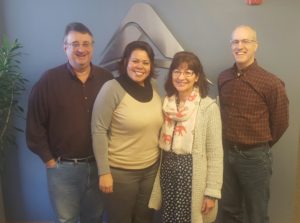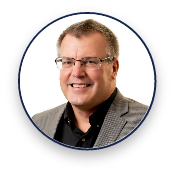Mission Critical
Applying Lessons from our Fellowship Program to Andesa Operations
Blog post by Ron Scheese, President & CEO
Andesa is about to launch its search process for our Andesa Fellowship program. The Fellowship allows for an employee to take up to three months of paid leave to make a meaningful impact within a 501(c)(3) charitable organization.
Andesa’s Distribution Services Manager, Larry Resnick, was the innaugural Andesa Fellow and served ERASE Child Trafficking. I sat down with Larry and a few other Andesa employees who have made “mission service” a part of their life experience. Joining Larry and I were Lead Systems Engineer, Dan Dougherty, Client Support Specialist, Carol Kistler, and Project Manager, Alexsandra Lopez.
 The scope of work and travel by this small group covered building projects, small clean-up and restoration work, providing business and strategic organizational support, teaching English as a second language, vacation bible school and orphanage ministry. Our group had spent time in Haiti, Honduras, Hungary, Jamaica, Kenya, Puerto Rico and Thailand; not to mention other US cities and projects near our hometowns.
The scope of work and travel by this small group covered building projects, small clean-up and restoration work, providing business and strategic organizational support, teaching English as a second language, vacation bible school and orphanage ministry. Our group had spent time in Haiti, Honduras, Hungary, Jamaica, Kenya, Puerto Rico and Thailand; not to mention other US cities and projects near our hometowns.
The group shared similar stories of enriching and life-changing experiences which “rocked my world.” The meaning and impact on each person who served was shared by all, speaking of an inner blessing – not necessarily of what was accomplished or done; but what was received on a deep, personal, emotional level by stepping outside one’s comfort zone.
What is Mission Critical?
Mission critical is defined as something vital to the functioning of an organization when it comes to technology and software terminology. I was interested in hearing from the group how their mission experiences translated into meeting the challenges of their day-to-day business life and successful careers.
Our conversations focused around four common themes:
Flexibility Towards Events and Ideas
The mission experiences were not scripted and were unrelated to the normal occupations of the participants. Events don’t always go according to plan, and one must frequently shift gears and accommodate to a different expectation. Often one finds themselves more open to change because it’s not their area of expertise. To contribute, one must maintain an open mindset towards other perspectives and ideas.
How many of us approach our business work the same way? We expect things to be a certain way and can become easily frustrated with change or when items don’t go according to plan. Going with the flow feels unprofessional, and we force our ideas and methods into the conversation and problem. Involvement with mission work reminds us to be adaptable and accepting of changing circumstances.
Perspective of the Broader Picture
We often miss the big picture when we narrow our focus to our own work and tasks. In mission projects, one is often called to use a different skill or gift; and we begin to glimpse a broader view. One of the members described the work as a large quilt in which we are the strings, and it is difficult to sometimes see how God is weaving their life into the quilt; until we take a step back and admire the broader picture.
From a business standpoint, it is important to understand how what one does contributes to the team and the organization’s results. But it is often the case that we get caught up in personal goals and “to do lists” without the perspective of the whole and broader picture. It’s like the athlete concerned about his or her own statistics despite the team’s win-loss performance. Taking a step back and looking at the broader view can help encourage you through a difficult period and keep things in perspective.
Maintaining a Balanced Focus on Means and Ends
Most business enterprises are results-oriented organizations. Mission efforts tend to be more about the process, as results are often longer-term and sometimes unknown. It is rewarding to see a building project complete and results achieved, but often the deeper, more personal results may not manifest themselves during the work effort and take years to come to fruition.
Finding balance between ends and means is paramount. It is important to achieve project objectives and measure the results in terms of operation performance, satisfaction and financial outcomes. But it is equally imperative to invest in the people and relationships, where results are not as easily measured and the meaningful impact may take years to mature. I have found that loving the process is critical and rewarding, while maintaining a balanced focus on results can produce impact.
Teamwork and Collaboration
It was interesting to hear the group use the words collaboration, focus, support, encouragement, connections and interactions throughout the conversation about their mission work. They each spoke of relationships and admiration of teammate’s talents and gifts, impressed by the harmony, despite the diverse backgrounds of people pulled together for a particular project.
Collaboration is a critical business skill, and working well with others, both internally as well as externally, is a core expectation of most professions. The ability to appreciate other’s expertise, and listen and respect one another’s perspective is paramount to achieving one’s goals. Collaboration on teams provides a tremendous opportunity to learn from others and grow personally.
Our group would encourage everyone to step outside their comfort zones, find a service project opportunity, be flexible and go with the flow. Be open and you will be able to find some way to give back. We can promise an enriching and eye-opening personal experience.
Follow Ron on LinkedIn: Ron Scheese or on Twitter: @RScheese
See this blog and previously posted blogs here.
Follow the Andesa Blog
"*" indicates required fields




